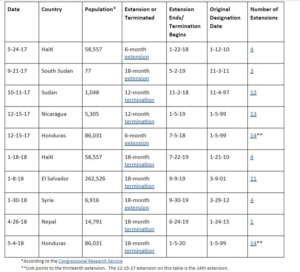Last week, the Trump Administration ended another TPS program – for Hondurans – despite reports from in-country diplomats, obtained by the Washington Post, that warned against doing so. This termination comes after 13 reviews and extensions across four other Republican and Democratic Administrations. Of the eight programs up for extension since Trump became President, this Administration has ended six, terminating TPS for 428,258 individuals, or 98% of all current TPS recipients. Like the TPS program for Honduras, many of these programs have had multiple reviews and extensions across Republican and Democratic Administrations.
Under the law, TPS extension decisions are periodically made (generally every 18 months) by the Secretary of Homeland Security in consultation with the Department of State, which provides factual analysis of country conditions based on deep knowledge of experts familiar with the country. In the case of Honduras, El Salvador, and Haiti, according to cables obtained by the Washington Post, U.S. diplomats “warned that mass deportations could destabilize the region and trigger a new surge of illegal immigration.” Nevertheless, senior officials in the Trump administration ignored their analyses and recommendations.
Instead, “Trump senior adviser and immigration hard-liner Stephen Miller placed phone calls to DHS Chief of Staff Chad Wolf and top [Secretary of State] Tillerson advisers telling them to end TPS anyway.”
John D. Feeley and James D. Nealon, former Ambassadors to Honduras and Panama have publicly confirmed the views of current diplomats, explaining that ending TPS for unstable countries will undermine efforts between the U.S. and Honduras to address “push factors,” real progress in addressing the very issue Trump has been tweeting about for weeks. “Cancelling TPS…ensures that U.S. taxpayer assistance, designed to help Honduras see their future in Honduras and not in the United States, works against itself.”
White House Pressure to Ignore the Law is Not New
When it came time to consider the TPS extension for Hondurans last year, former Secretary of Homeland Security Elaine Duke was reportedly pressured by White House Chief of Staff John Kelly to terminate the program, despite her intention to extend the program.
According to a White House source, Kelly repeatedly called Duke to express concern that her decision not to end Honduras TPS could “‘prevent[] our wider strategic goal’ on immigration,” as Washington Post reported. According to this source, Kelly also told Duke that ending TPS programs “‘shouldn’t be a problem for the next secretary to deal with.’” Duke was reportedly incensed by the pressure and threatened to resign.
Instead of an affirmative decision to extend or terminate TPS for Hondurans, the Secretary failed to make a determination within the required time period, so the program was automatically extended for an 6 additional months, as required by law.
Just weeks later, on November 20, 2017, when Secretary Duke was charged with deciding the fate of almost 60,000 Haitians with TPS, Duke affirmatively terminated the program, as Kelly had pressured her to do with the Honduran TPS program.
Duke soon stepped down from her post as Secretary with the confirmation of Secretary Kirstjen Nielsen in December and a few months later resigned from her position as Deputy Secretary.
And, just as Kelly had predicted, the newly-appointed Secretary, reportedly hand-picked by Kelly, had no problem ending TPS programs. Though Nielsenextended the smaller Syria TPS program, she terminated TPS for El Salvador, currently the largest TPS program with more than 260,000 participants, despite warnings from U.S. diplomats.
Furthermore, on May 4, 2018, Nielsen did what Duke refused to do under pressure from Kelly – she ended TPS for Hondurans, also in defiance of State Department analysis of country conditions.
Ur Jaddou, Director of DHS Watch, a new project of America’s Voice,
“The law requires a careful consideration of the facts in determining whether to extend a TPS program, not a predetermined conclusion based upon a ‘wider strategic goal’ on immigration choreographed by the White House.”
“Even if you discount the diplomatic cables warning of dire consequences, it defies logic that conditions have so quickly improved in all these countries, and in the same short time period, to warrant terminating TPS — reversing positions made by both Republican and Democratic Administrations over the past two decades. After all, no more than 18 months passed since country conditions were last reviewed for each of these countries.”


